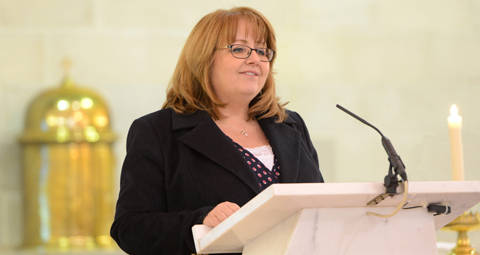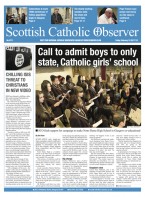February 17 | ![]() 0 COMMENTS
0 COMMENTS ![]() print
print

The great rewards of teaching RE
Josephine Hughes, RE advisor for SCES, on a unique challenge to the world of league tables and statistics
I remember it well. I sat in the course director’s office at Notre Dame College, and struggled with my decision.
The problem was this: I wanted to do a double major with my B Ed degree, but I was torn between three subjects. Which to choose? There was no doubt about what was the more sensible option: English and French. Why sensible? Well, firstly, I already had a good academic record in both. Secondly, in terms of career advancement, these were the solid choice. Every school had an English department and a Modern Languages department. Both were probably quite large, and that meant opportunities for promotion, especially in the days when we still had assistant principal teachers.
So what was the problem? I wanted to major in RE. Like most pupils at Scottish Catholic secondary schools then, I had never encountered an RE department in school. The chaplain seemed to be in charge of all of that, in so far as anyone was. It seemed that anyone could teach RE and, although my school took it seriously, I would have to say that not every teacher seemed to be ‘on message’ with that. I had never heard of anyone who had had an RE exam, and had no real idea what might constitute Higher RE, if indeed it existed. I was certainly not aware of there being any such thing as a principal teacher of RE, let alone aspire to that as a career choice.
So, why struggle with what seemed to be such a clear-cut decision? It was because I found RE fascinating. A subject where we were not just being prepared for exams; to be judged by an examiner who would never see me, let alone know me, nor care about how I thought. I was so attracted by the idea of a subject which demanded exploration as well as learning; a subject where I would have the freedom to relate my own life, and the things that were happening in my world, to a body of knowledge and learning which seemed to be boundless in depth and width.
A subject that taught me as much about questioning as it did about answers. The part of me that wanted a successful career wanted to choose French and English; the part of me that wanted to be a good teacher wanted to choose RE.
I made the ‘sensible’ choice, and chose French and English. For a couple of years I taught both, and was happy to do so. However, I then found myself in the position of being declared surplus, and was offered the opportunity to retrain, and I knew exactly what I wanted to do. By this time RE departments were being established in more and more schools, and there was a real need for specialist teachers, so I went back to studying, and retrained as an RE specialist.
That was 25 years ago, and I have never regretted that choice. It is my firm belief that there is no subject that tests, nor stretches, nor rewards you as a teacher as much as RE does.
In a world of exam statistics and league tables, there is a tendency to fall into the trap of thinking that our scores reflect the value of our learning. I feel that RE is the best example of how we can challenge that perception. Certainly, as professionals, we cannot say that assessment doesn’t matter; we owe it to our pupils to give them the opportunity to show, principally to themselves, how they are improving and progressing. However, we can show them the value of the process of learning: how we are changed by learning, and how that improves us and makes us better able to help others improve. The value of listening and not just talking, the value of reflecting and the value of learning from and with others, as well as learning about them.
This is true of all good RE teaching, but there is, of course, a special dimension in teaching RE within a community of Faith. Teaching RE as a Catholic teacher within a Catholic school is uniquely rewarding. To be able to share the prayer and Sacramental life of the school is something every teacher in a Catholic school should cherish, but to be able to explore these events with young people in their RE class, to share with them in that experience of Christ and exploration of self, is something to be respected and treasured.
Some of the strongest influences in my own Faith life, especially when I was younger, were people who had left school at 14, and who had certainly never read a theology book; they understood their Faith through the practice of it, through the strength they gained through prayer and the sacraments, through knowing that they were loved by God, and that that gave them the duty to love others.
This message of unconditional love, of the possibility of a world of peace and justice, has always been a good and true message, and it remains so today, in spite of the many pressures faced by our young people. Even those who struggle with their Faith, or who find themselves unable to believe at all at this point in their lives—those who find it hard to love themselves let alone others—can benefit from sharing in a school ethos centred on the love of Jesus.
I have recently taken on a new role in my career. I am now fortunate enough to be RE Adviser for Motherwell Diocese, and for the Scottish Catholic Education Service. I didn’t have to struggle with that choice. We are at an exciting time in education in Scotland, and particularly in Catholic education.
As we approach the centenary of the 1918 Education Act, which saw Catholic Schools become part of the fabric of our state education system, there are certainly new challenges. However, we are constantly refreshed by new staff, new pupils and new ideas, and can take confidence from the firm foundations on which we build. I personally look forward to the journey.











